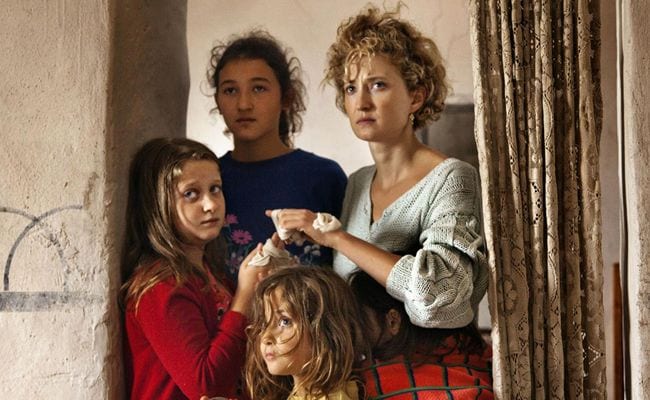
Two pin-pricks of light break the dark night, headlights shining in the Italian countryside. Further illumination appears from those following behind. It’s an apt start for a film that offers only rudimentary colour at first, gradually shading in around the edges until the picture takes shape. An astutely drawn coming-of-age tale pitting youth against parents and tradition against progress, The Wonders hints at a great deal of promise that a sparse narrative can’t fully tap into.
Set in the world of countryside beekeeping, this Rohrwacher family affair arrives after scooping the 2014 Cannes Grand Prix. Alice Rohrwacher stands behind the camera in a heavily autobiographical piece that also features her older sister Alba. Both have graced the festival circuit in recent years: Alice launched her debut feature Heavenly Body in Directors’ Fortnight at Cannes in 2011, and Alba won Best Actress at Venice last year for Hungry Hearts, on top of performances in films competing in the main competition at Berlin and Cannes this year. Both will likely grace the circuit for years to come.
The sisters grew up with an Italian mother and German father keeping bees in Tuscany. This is the exact dynamic in The Wonders, with Alba playing the placid mother Angelica, and Sam Louwyck the gruff embattled father Wolfgang. Neither takes centre stage; that’s a space reserved for Maria Alexandra Lungu’s Gelsomina, the oldest of four sisters. This is her film: in it, she moves from child to quasi adult, from submissive daughter to independent spirit and a protector of tradition. Lungu, here in her first film, is a great find. Never overly showy, she tackles the pivotal role with quiet determination, adding a believable intensity that pads out her thinly sketched personal journey.
That’s the main problem with Rohrwacher’s (Alice) film. It’s more interested in the methodical details of beekeeping than it is with conventional narrative, yet the characters don’t quite have the depth to pull off such an approach. Angelica slides into the background wasting Alba’s talents, while Wolfgang blows hot only briefly before disappearing in long cold spells. The rest of her siblings are nothing more than background wallpaper, the scenery in which Gelsomina finds herself. The one relationship that rings surprisingly true is with Martin (Luis Huilca), a German juvenile offender hired on a rehab programme to provide cheap labour. He strikes up an intriguing rapport with Gelsomina, one that thrives on growing hormonal attraction as the two teens take their first steps into the world of adults, and tinged with sadness as she realises her emotionally withholding father might view the interloper as the son he always wanted above all daughters.
Despite these flaws, Alice captures the intricacies of a soon-to-be defunct traditional life with unerring precision. The family house is almost devoid of soft furnishings, a monument to shabby practicality. There’s even a bed setup in the field outside from which Wolfgang can leap swiftly into action when the hunters, the inhabitants of those night-time vehicles in the opening scene, come near his land. Great attention is placed on the honey business. The children guide the bees to plants, collect the produce, scrape it down and fill great buckets. The biggest disaster occurs when a hand injury leads to an overflow of the sticky amber liquid. They’re soon on the floor scooping it back up before Wolfgang discovers the transgression.
The death throes of this detached farming life are exemplified at the end by a gloriously tacky television show that caps the march from opening black to vivid colour. Monica Bellucci’s blonde wig-wearing presenter rocks up for a disco-lit Countryside Wonders TV competition to find the most traditional farming family. Gelsomina covertly enters them into the show, much to the horror of her father, who worries that the authorities will discover their farm isn’t compliant with all the many bureaucratic regulations required in the modern honey game. She’s defiant when he rebukes her, clear that the prize money is worth the risk if it saves their dying way of life.
Here’s the fascinating dichotomy that makes The Wonders so watchable even as it struggles to find the depth to match early promise. Part of the film focusses on Gelsomina’s coming-of-age, the young teen finally finding her own voice in the face of a reckless father who makes them do all the work while he fritters away money on useless purchases like a camel. Yet she’s hardly rebelling, instead trying to use a show that mocks tradition to save theirs. Gelsomina’s journey is not so much that of a subjugated child breaking free from her parent as it is the child taking over from the parent. The balance between Lungu’s character and the rest is never quite right, but the battle she fights, futile though it may be, is never less than absorbing.


![Call for Papers: All Things Reconsidered [MUSIC] May-August 2024](https://www.popmatters.com/wp-content/uploads/2024/04/all-things-reconsidered-call-music-may-2024-720x380.jpg)



